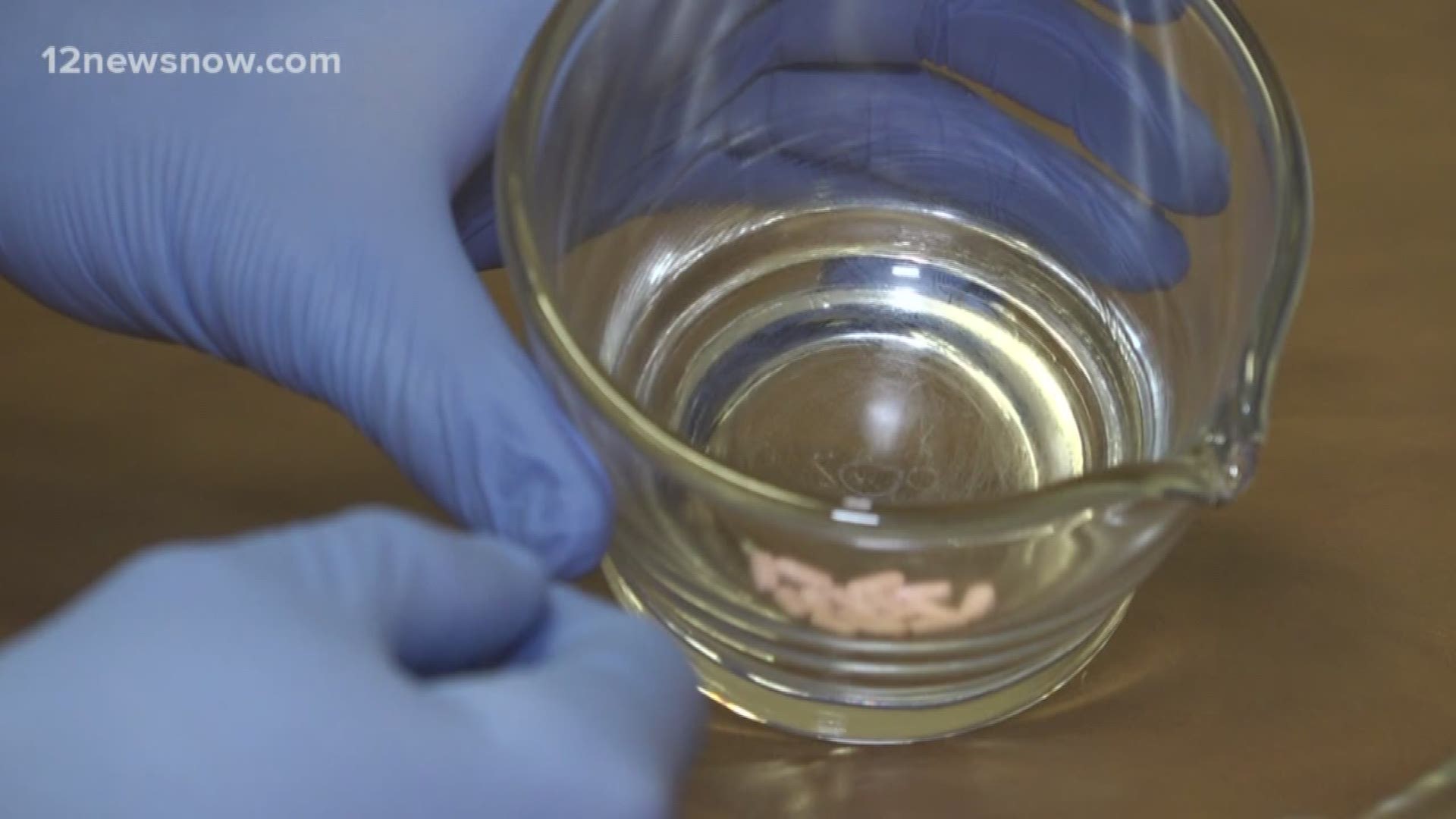BEAUMONT, Texas — Compounding is a technique found in pharmacies across the nation. It is used to create drugs to fit patients' special medical needs.
For instance, if a patient if allergic to a certain dye, a medication can be made without that dye. Or if a patient cannot swallow a pill, compounding can form the medication into a liquid dose.
But compounding isn't without controversy. Sixty patients have sued a compounding pharmacy in the Dallas area, saying a drug compounded by the facility damaged their vision.
12News’ sister station in Dallas, WFAA, uncovered this story. They spoke with several of the patients who said following a routine cataract surgery, they were given a compounded drug that left them nearly blind.
The patients' lawsuit blames Guardian, the Dallas-based compounding pharmacy that made the solution, and two surgery centers; Park Central Surgery Center and Key-Whitman Eye Center. Patients said that’s where doctors injected Guardian's solution into their eyes.
“Put on the darkest sunglasses you can find, fog up the window and look out of it. That is my best eye. My worst eye you probably need to put on a welding helmet," said Curtis Cosby, one of the patients.
Unlike FDA approved drugs, compounded drugs are not government tested. Guardian Pharmacy owners have declined interview requests by our sister station. But in an email, Jack Munn, the pharmacy's president denies responsibility; “No scientific connection has been established by any entity between the drug Guardian Pharmacy Services compounded and the illnesses that have been reported.”
In a review, FDA investigators raised questions about the solution's formula and process used to compound the drug.
Compounding pharmacies can be found across the nation. 12News found at least half a dozen in southeast Texas that mention compounding on the pharmacy's sites. 12News investigates visited a local pharmacy that compounds to find out what safety measures are in place.
Drug compounding happens daily at Family Pharmacy on Calder in Beaumont. Pharmacists estimate they make 15 to 20 compounded medications a day to meet patients’ unique needs.
"A lot of times there's not a commercially available product that the patient would need. Or the dose isn't correct, so we are able to customize it for that patient by compounding. So we take the ingredients and we make them into capsules, tablets, a lot of times we do gels and creams,” Andy Haeggquist, Director of Pharmacy Operations said.
At Family Pharmacy, the individual drugs used in compounded medications are FDA approved, but the newly created drug made by the combination is not reviewed or tested by the FDA.
"Because we are making the drug for the patient, it is a customized medication for the patient the FDA doesn't have any way for us to give approval for that. But they do give us a list of bulk meds we can use for compounding,” Haeggquist said.
Even though they are not approved by the FDA, there are guidelines and oversights in place to protect you. One of the most well-known resources is called the United States Pharmacopeial or USP, a non-profit that’s been around for nearly 200 years.
USP provides the necessary calculations for compounding and dispensing medications. It also outlines quantities of ingredients, dosages, infusion rates, training procedures and cleaning protocols.
“They actually tell us, 'hey, you have to have these standards,' this is the way we go about compounding and these are the procedures we should take when we are compounding,” Haeggquist said.
And there’s more in the way of protection. In November 2013, the Drug Quality and Security Act was signed into law. That establishes clear lines of oversight accountability. Each state must have an agency to oversee compounding pharmacies. In Texas, that responsibility falls on the State Board of Pharmacy. State regulators said they haven’t revoked the license of any compounding pharmacy in Texas over the past five years.
Pharmacists at Family Pharmacy said the medications they make abide by all professional guidelines. They’re tailor-made for the patients who depend on them.
“Yes, they can feel good and safe. What we do is customize to what the physician is asking. So if the physician has a specific dose you need, we would love to take care of it for you,” Haeggquist said.
If you are prescribed a compounded medication here are some questions you may want to ask your doctor or pharmacist;
First, ask your doctor if there is an F-D-A approved drug available. Check with your pharmacist to see if he or she is familiar with the compounding product in your medication. Ask about training, equipment and the process used to compound the medication. If you receive a compounded drug, ask the pharmacist if your doctor asked for it to be compounded. Report any adverse events to the FDA’s Medwatch program and your doctor.
Editor's note: Guardian Pharmacy Services in Dallas is not affiliated with the national long-term care Guardian Pharmacy Services, LLC headquartered in Atlanta.

